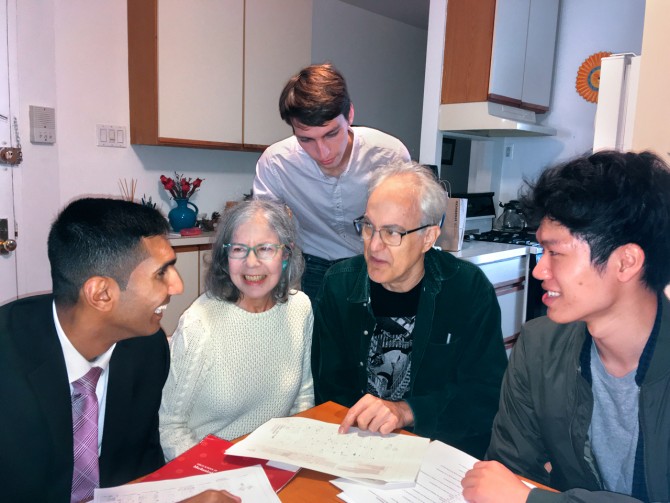Student engineers to ply their green skills in NYC
By Blaine Friedlander
Cornell engineering students are working with an Ithaca, New York, engineering firm to help New York City lower its carbon footprint.
Taitem Engineering has partnered with the students on a heating system retrofit project in an apartment building on Manhattan’s Upper West Side.
The building will switch from using fuel oil for steam heating to using electricity to power heat pumps. While Taitem Engineering is responsible for designing the new heat pump system, Cornell students, as independent auditors, will quantify the energy and environmental performance of both systems.
After the Thanksgiving holiday, the students will install temporary sensors, which will gather data on the indoor thermal environment and energy efficiency. The sensors will remain in the building collecting data for at least a year.
“Fuel oil-based heating is not only very carbon intensive, but also emits criteria air pollutants such as particulate matter and nitrogen oxides,” said Max Zhang, professor of engineering and the student group’s faculty adviser. “In the middle of Manhattan, where most apartment buildings burn carbon-based fuel for heating, retrofits will prompt co-benefits of climate and public health – reducing carbon emissions and removing local air pollutant hotspots.”
The New York City Department of Health and Mental Hygiene has identified the combustion of heating oil as a leading contributor to local air pollution. According to the Mayor’s Office of Sustainability, the building sector produces more carbon emissions than any other sector in the city, making building retrofits a top priority in achieving the ambitious goal of reducing carbon emissions 80% by 2050.
Throughout the fall semester, nine students have worked with engineers at Taitem, who will use the building as a model for converting a carbon-based heating system into one using cleaner energy.
Andrew Siler ’20, who visited the project building with other team members in mid-October, said residents are concerned about the new system’s cost and reliability.
“Most residents thought that heat pumps were the right choice, as the units also provide air conditioning and produce no emissions onsite,” said doctoral student Zach Lee. “Our job is to evaluate the comfort and efficacy of the heating oil system compared to the heat pump system.”
While conversion to heat pumps can lead to reduced energy use, no onsite air pollution and lower energy bills, more information is needed regarding the overall economics, improvement of comfort levels and ambient air quality benefits, said Zhang, a fellow at the Cornell Atkinson Center for Sustainability.
Doctoral student Alfredo Rodriguez said sensors will be placed in bedrooms, living rooms, bathrooms, common spaces and the basement. The data will be shared with the residents in real time as part of the effort to create a New York statewide Internet of Things network.
For this venture, Rodriguez said he has enjoyed addressing real-world engineering problems. “When I first heard about this project, I thought it would be really interesting,” he said. “Often work as a student is confined to the lab, but this allows you to learn from real-life settings and buildings.”
After the project concludes in the spring, the students will submit their findings on air quality, energy efficiency, carbon emission reduction and thermal comfort to peer-reviewed journals to document the process.
This project provides students with valuable engaged learning opportunities, said Zhang, who is also a member of the faculty advisory committee for Engaged Cornell. Engineering industry practitioners and building residents, students will also engage the New York City Mayor’s Office, related city departments and other local policymakers in this project. The Mayor’s Office indicated that the conversion project could serve as a building retrofit demonstration site for the entire city.
In addition to Siler, Rodriguez and Lee, team members are Jilly Jiaqi Cai ’20; master’s students Daniel Liang ’19 and Eric Bachoo ’19; and doctoral students Khaled Nabil Hashad, Ali Amadeh and Bo Yang.
Media Contact
Get Cornell news delivered right to your inbox.
Subscribe

